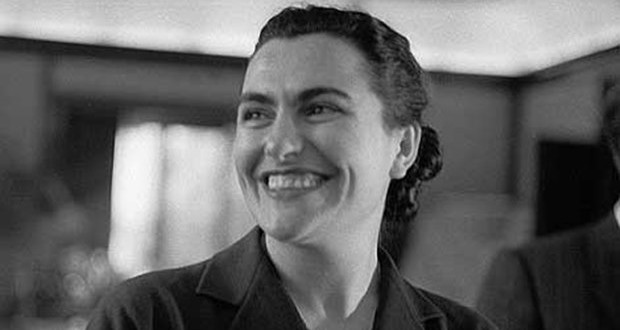(Virtual Vita Nuova) – She was the last living icon of the former Yugoslavia. Jovanka Broz died at the age of 89, and was buried in Belgrade in the tomb of her husband, Marshal Tito.
Despite her estrangement from Tito in his last years and the violent collapse of his regime, her burial was a solemn ceremony. Some ten thousand people were present, many delegations and numerous accredited foreign press.
Jovanka asked explicitly to be buried in that place, and serenaded with the song “Bella Ciao,” the famous anthem of anti-fascist partisans from World War II. Her last wishes were granted, and the premiere of Serbia even saw fit to deliver a goodbye eulogy to the First Lady of a nation which no longer exists.
So Jovanka’s long lifespan marks an end not only to fascism and communism, but also to the Balkan bloodshed of the nineteen-nineties. Her burial marked a re-emergence for the Tito, whose heritage of regional communism and the non aligned movement was disowned by all concerned. His name was expunged from the school text books of the ex-Yugoslav republics. The newly nationalist countries were anxious to deny the historical fact that they were once a federal unit, internationalist in spirit, keen on Tito’s hopelessly outdated dicta, such as the brotherhood of all Balkan nations, self-managed socialism, and foreign policies engaged with the Third World.
My daughter, who grew up in those war-torn years, once asked me candidly: Who was this Tito? Was he a good guy or a bad guy? It was an astonishing eclipse for an iconic regional strongman who had ruled one the world’s most turbulent areas for 50 years in peace.
As for his much younger last wife Jovanka, who had been his nurse and a secretary and one of the most controversial figures of the regime, destiny was crueler yet. After her husband’s death in 1980 she vanished entirely from the public stage, in a new life as obscure and imperiled as her teenage years as a Communist partisan. She was undocumented, a kind of internal illegal exile, she lived, surveilled, in a decaying house which was not her home.
She scraped by through the charity of relatives. A few years ago, she finally got a citizen’s ID from the new regime, but she asked nothing else. She was already sick but she kept her head down, in fear, pride or disdain, until the very end.
Still a beautiful woman when pushing ninety, Jovanka did release a few press interviews, but, with the just caution of a revolutionary’s consort, she never said much. However, this Red queen of Yugoslavia did express her regret ( to the italians women magazine “Grazia”), as a Serbian ethnic, for the slaughter brought on Muslims, her fellow citizens, by the Serbian militia. This was all the more remarkable as, during Tito’s lifetime, she’d been accused of a disloyal Serbian nationalism and even placed under house arrest for it.
Despite his consort’s many enemies, Tito always refused to divorce her, although she was not allowed to visit him at his deathbed, and, once he perished, she was stripped of everything they had owned as a married couple.
Today she deliberately joined him in his tomb, and the people and press still find her enigmatic. Biographies exist, most of them friendly toward their subject, others considering her a dangerous and tragic fatal woman. Her life story is the story of her nation, a utopian idea that started with a revolution and ended in blood, a nation that was younger than Jovanka and died long before she did.
Jovanka Broz was the age of my late mother, who was also a clandestine Balkan revolutionary communist. As a child, I once met her in Cairo when she acccompanied Tito for an official visit to his close ally, Nasser. My mother acted as her diplomatic hostess.
In those days in socialist Cairo, Tito was a much-respected world politician, and I had a kid’s book of the period which I still possess. This patriotic tome was titled, “My Home is Yugoslavia,” and its little-girl heroine gamely told her little foreign friends how her country was made of six different republics, that they all had different religions, different ethnicities, music, foods and costumes, yet they all lived together in peace…
Though I was a child then, I remember vividly how these two adult women, my mother the diplomat and my nation’s first lady, looked quite alike to me. Though they were Communists and gritty survivors of World War Two, they were strict, elegant, and mannerly women, and keen on feminine refinements such as tailoring, polished furniture and a fine singing voice. They were on a Yugoslav crusade to show the world that the sturdy women of Tito’s workers and peasant’s state were also elegant, attractive and respectable. This attitude was far from popular among the scowling cadres of the Communist Party, though few complained about Marshal Tito’s tailored suits, immaculate medals and spotless white gloves.
Even my Mom didn’t much care for Jovanka. She privately complained that the First Lady was a demanding upstart, boasting about her family ties to Nikola Tesla, who might have been a genius, but wasn’t much of a gentleman.
Jovanka never had children of her own. She had few family and fewer friends, outlived most of those, and spent her last years isolated in a decaying villa. Burglars robbed the place a few months before she died. She dutifully reported the crime to the police, but said nothing about her serious health problems, which were only discovered when the police showed up at her door. Sometimes friends sent small gifts to this proud and silent woman: an austrian “sucher” cake, a bunch of flowers. Then she was profuse in her gratitude.
During her funeral, a riot broke out among the elderly fans. They had come to commemorate the loss of their homeland, so their nostalgia apparently needed an outlet.
We may not be so far from days when Tito’s Yugoslavia is judged with the calm objectivity historians devote to its precursor, the Austro-Hungarian Empire. They are both ancestors of today’s United Europe, after all, and heaven only knows how that enterprise will end up. Modern Europe doesn’t lack for powerful women, and if they outlive it they too may learn what Jovanka Broz learned: that sometimes people produce more history than they can manage.
 East Journal Quotidiano di politica internazionale
East Journal Quotidiano di politica internazionale




